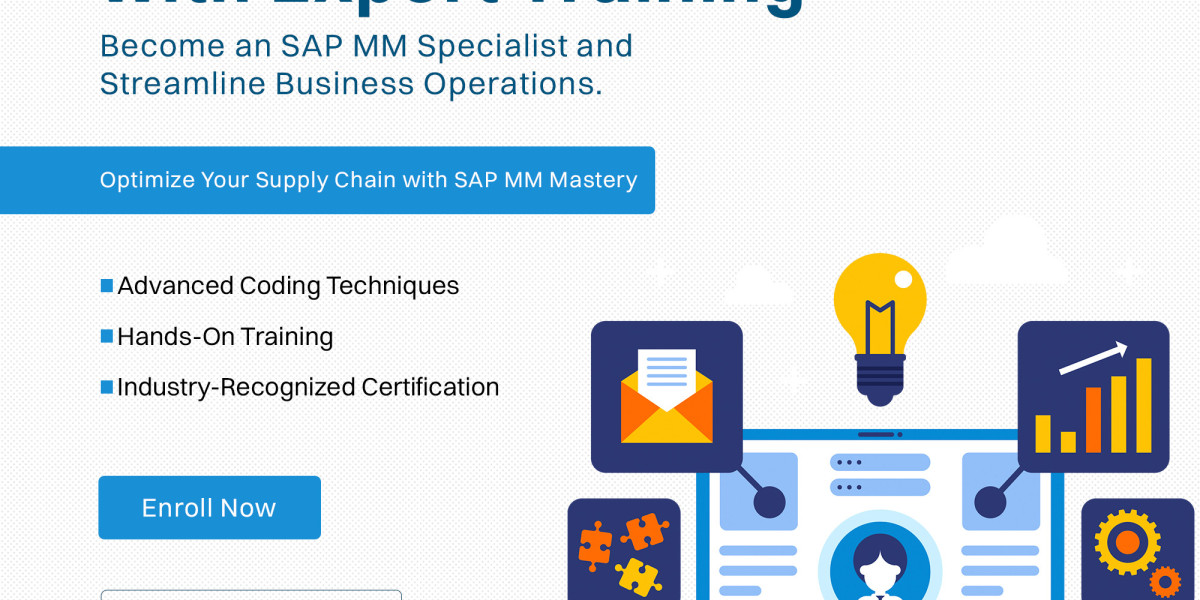The field of materials management is vital for businesses seeking to streamline their supply chains and improve operational efficiency. SAP, one of the most widely used ERP systems globally, offers a specialized module—SAP MM (Materials Management)—that plays a crucial role in handling procurement, inventory, and supply chain processes. But what exactly does the SAP MM course syllabus include, and how does it help you build a strong foundation for a successful career in materials management?
Knowing the contents of the syllabus is key to understanding how SAP MM prepares you for the professional world. Whether you're an aspiring SAP consultant or a professional looking to upskill, having a clear idea of the course's scope and depth will help you make an informed decision.
Understanding the Core Framework of SAP MM Course Syllabus
The SAP MM course syllabus is a comprehensive guide to mastering the intricacies of materials management. Starting with basic ERP concepts, the syllabus moves into more complex topics such as inventory management, procurement processes, and valuation. While the syllabus may vary slightly depending on the institution offering the course, the core structure remains consistent.
At its core, the syllabus is designed to introduce learners to SAP MM's critical functionalities. The initial part of the course focuses on the foundational concepts of SAP and how it integrates different business operations. From there, the training delves into the specifics of materials management, such as procurement cycles, purchase orders, and inventory control methods. This stage is crucial for building a solid understanding of the SAP MM system.
Once learners have mastered the basics, they move into more advanced sections of the syllabus, including valuation, account determination, pricing procedures, and materials requirement planning (MRP). These advanced topics ensure that professionals can handle complex supply chain challenges within any business setting.
Key Elements of the SAP MM Course Syllabus
The SAP MM course syllabus is divided into several modules, each focusing on different aspects of materials management. While each module plays a distinct role, together they form a cohesive system for understanding the flow of materials in an organization. Some of the critical topics covered include:
- Introduction to ERP and SAP MM: The course typically begins with a basic understanding of enterprise resource planning (ERP) systems and how SAP MM fits into the larger SAP framework. This module also explores the role of materials management in ensuring smooth operations within a business.
- Master Data in SAP MM: A large part of materials management revolves around master data. This module covers the creation and management of critical data such as the material master, vendor master, and purchasing info records. Understanding master data is essential for managing procurement processes and inventory in SAP MM.
- Procurement Process: Procurement is the backbone of the materials management module. In this section, the syllabus explores various procurement activities, such as purchase requisitions, purchase orders, and request for quotations (RFQs). The training also covers different types of procurement, including external procurement, subcontracting, and stock transfers.
- Inventory Management: Proper inventory management is essential for avoiding production delays and ensuring that materials are always available when needed. This part of the syllabus focuses on stock types, stock movements, and inventory control methods. Through real-world examples, learners gain a deep understanding of how to manage inventory efficiently using SAP MM.
Diving Deeper Into SAP MM: Advanced Topics
Once the fundamentals of SAP MM are covered, the syllabus delves into more advanced topics that equip professionals to tackle complex challenges. These advanced modules not only expand on earlier concepts but also introduce new areas that are vital for optimizing materials management in large-scale operations.
- Valuation and Account Determination: In the context of materials management, valuation refers to determining the value of materials at different stages of the procurement and production processes. Account determination, on the other hand, is how the system maps financial transactions related to material movements. The SAP MM course syllabus covers these concepts in depth, ensuring that learners can effectively manage the financial aspects of materials management.
- Pricing Procedure: Managing pricing in procurement is a critical part of ensuring profitability. The syllabus includes configuring pricing procedures, managing pricing conditions, and setting up pricing schemas in the SAP MM system. This module enables learners to understand how prices are calculated and adjusted for different procurement scenarios.
- Invoice Verification: Invoice verification is the final step in the procurement process, where invoices from suppliers are matched with purchase orders and goods receipts. This module provides in-depth training on how to handle discrepancies and ensure that payments are processed accurately. Invoice verification is crucial for maintaining healthy relationships with suppliers and keeping financial records up to date.
- Materials Requirement Planning (MRP): One of the most critical elements of the SAP MM course syllabus is MRP. This process ensures that materials are available for production and that inventory levels are optimized. By learning how to configure and execute MRP within the SAP system, professionals can ensure smooth production cycles and reduce the risk of stockouts or excess inventory.
Practical Applications of SAP MM in the Real World
The SAP MM course syllabus is designed to be hands-on, with a strong emphasis on real-world applications. As learners move through the course, they are exposed to scenarios and exercises that simulate actual business processes. This practical approach ensures that participants are not only learning theory but also acquiring the skills needed to implement SAP MM solutions in a professional setting.
For example, in the procurement module, learners might be tasked with creating and managing purchase orders for a hypothetical company. Similarly, in the inventory management module, they may be asked to execute stock transfers and manage material movements within a warehouse environment. This blend of theory and practice is what makes SAP MM training so valuable to employers.
The Role of SAP MM in a Professional Career
The SAP MM course syllabus doesn't just teach you how to use SAP software; it prepares you for a wide range of roles within the supply chain and materials management sectors. SAP MM is used across industries, from manufacturing and retail to pharmaceuticals and logistics. Mastering the content in the syllabus will make you a valuable asset in any organization that relies on efficient materials management processes.
Professionals who complete the SAP MM course often find opportunities in roles such as SAP MM Consultant, Materials Manager, Procurement Specialist, and Supply Chain Analyst. The demand for SAP MM skills is high, as businesses seek to optimize their supply chain operations using ERP systems.
How the SAP MM Course Syllabus Enhances Your Problem-Solving Abilities
One of the most significant benefits of completing the SAP MM course syllabus is that it equips you with problem-solving skills specific to materials management. Throughout the course, you will encounter numerous challenges that require critical thinking and a deep understanding of how materials move through an organization. By the end of the course, you will have the confidence and expertise to address complex supply chain issues.
For instance, the pricing procedure module helps you determine the most cost-effective purchasing strategies. The inventory management module enables you to handle stock discrepancies and implement control measures that prevent overstocking or stock shortages. These problem-solving skills make you not only proficient in SAP MM but also an invaluable contributor to your organization’s overall success.
Another SAP SD Course: https://connectingdotserp.in/sap-sd-course-in-pune/
Conclusion
The SAP MM course syllabus is a comprehensive roadmap to mastering materials management within the SAP ERP system. By covering everything from procurement and inventory management to advanced topics like MRP and account determination, the syllabus prepares you for a successful career in the ever-evolving field of supply chain management. The practical exercises and real-world applications make this course invaluable for professionals seeking to enhance their skill set and contribute to organizational efficiency.
In a world where businesses depend on seamless operations, SAP MM professionals are in high demand. Whether you’re just starting your career or looking to move up the corporate ladder, the SAP MM course is an investment that pays off in the long run. Understanding and mastering the SAP MM course syllabus will provide you with the expertise needed to thrive in a competitive market and make a tangible difference in the organizations you work for.








